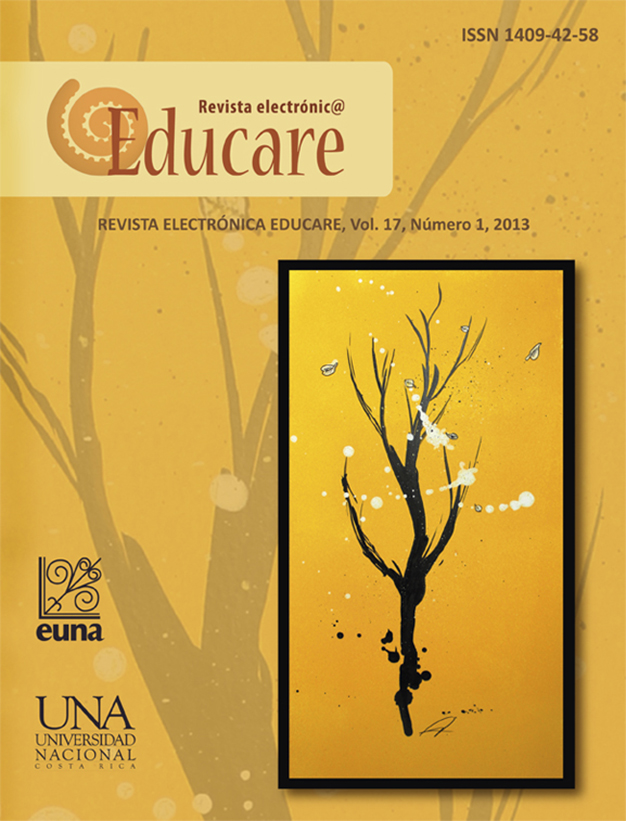Pedagogical Mediation as an Educational Strategy for Students with Mental Illness in alphabetization level offered in the National Psychiatric Hospital
DOI:
https://doi.org/10.15359/ree.17-1.8Keywords:
Mental illness, education, pedagogical mediation, Educare Electronic Journal, Costa Rica.Abstract
This study focuses on the work of teachers in the Open Education Program of the National Psychiatric Hospital (Costa Rica) and identifies the learning barriers of the student population. It aims at promoting educational delivery strategies adapted to the needs of the community attending the literacy level. This is a qualitative study with a participatory action research design. Information was collected through interviews to teachers, observation, and pedagogical mediation with the teachers of the program. The results indicate that the pedagogical mediation methodology contributed to improve the access of students to the curriculum. Among the conclusions, it is recommended to implement significant curriculum modifications focused on the student population and a classroom methodology adjusted to the different learning needs. Finally, it is recommended to have an interdisciplinary team to support the teaching staff working with students with mental illness.
References
Arroyo, L. y Chávez, M. (2001). Discriminación en el derecho a la educación de los niños y niñas.
(Tesis de licenciatura inédita), Universidad de Costa Rica, San José, Costa Rica.
Asamblea Legislativa de Costa Rica (29 de mayo de 1996). Ley 7600 Igualdad de oportunidades
para las personas con discapacidad. Diario Oficial La Gaceta 112, pp. 1-17.
Asamblea Legislativa de Costa Rica (29 de setiembre de 2008). Ley 8661: Aprobación de la
convención sobre los derechos de las personas con discapacidad. Diario Oficial La Gaceta
, pp. 1-65.
Cabada, J. M. (3 de noviembre de 2004). La atención educativa a la diversidad. Comunidad
escolar. Periódico digital de información educativa. 12(753). Recuperado de http://
comunidad-escolar.cnice.mec.es/753/tribuna.html
Elliot, J. (2005). La investigación-acción en educación. (5ª ed.). Madrid, España: Editorial
Morata.
Giné, C. (s. f.). Inclusión y sistema educativo. España: Universidad de Salamanca. Recuperado de
www.usal.es/~inico/actividades/actasuruguay2001/1.pdf
Lamas, H. y Murrugarra, A. (s. f.). Educación inclusiva. Perú: Sociedad Peruana de Resiliencia.
Recuperado de http://www.pasoapaso.com.ve/GEMAS/gemas_264.htm
Ministerio de Educación Pública. (1994). Resumen de política educativa hacia el siglo XXI. San
José, Costa Rica: Autor.
Molina, S. (2003). Educación especial. Bases metateóricas e investigadoras. Granada, España:
Editorial Ariel.
Organización de las Naciones Unidas para la Educación la Cencia y la Cultura (UNESCO). (2000).
Marco de Acción de Dakar. Educación para todos: Cumplir nuestros compromisos comunes.
Revista Latinoamericana de Estudios Educativos, 30(2), 133-140. Recuperado de http://
redalyc.uaemex.mx/redalyc/src/inicio/ArtPdfRed.jsp?iCve=27030206&iCveNum=964
Organización Mundial de la Salud (OMS). (2006). Manual de recursos de la OMS sobre salud
mental, derechos humanos y legislación. Ginebra, Suiza: Ediciones OMS.
Organización Panamericana de la Salud (OPS) y Organización Mundial de la Salud (OMS).
(2009). Resolución del Consejo Directivo CD 49.R.17. Washington, DC. Recuperado de http://
new.paho.org/hq/dmdocuments/2009/CD49.R17%20%28Esp.%29.pdf
Organización Panamericana de la Salud (OMS). (2010). Resolución del Consejo Directivo CD
R.8. Washington, DC. En línea en http://www.un.org/spanish/disabilities/documents/CD50.R8-s.pdf
Pinto, J. (s. f). Educación especial. Necesidades educativas especiales. Madrid, España: Editorial
Imserso.
Sánchez, A. (1997). Intervención psicopedagógica en educación especial. Barcelona: Editorial
Universitat de Barcelona.
Sandoval-Chacón, C. y Canales-Víquez, G. (2009). Funcionamiento psicosocial de personas con
enfermedad mental desinstitucionalizadas: Una experiencias de rehabilitación psicosocial
costarricense. Revista Costarricense de Psicología, 29(41-42), 121-135.
Williamson, G. (setiembre, 2007). Diversidad en la educación: fundamentos, reflexiones y
propuestas. Sembrando Ideas Revista Educativa, 1, 57-65. Recuperado de http://issuu.com/
villarricauc/docs/2007/1#share
Downloads
Published
How to Cite
Issue
Section
License
1. In case the submitted paper is accepted for publication, the author(s) FREELY, COSTLESS, EXCLUSIVELY AND FOR AN INDEFINITE TERM transfer copyrights and patrimonial rights to Universidad Nacional (UNA, Costa Rica). For more details check the Originality Statement and Copyright Transfer Agreement
2. REUTILIZATION RIGHTS: UNA authorizes authors to use, for any purpose (among them selfarchiving or autoarchiving) and to publish in the Internet in any electronic site, the paper´'s final version, both approved and published (post print), as long as it is done with a non commercial purpose, does not generate derivates without previous consentment and recognizes both publisher's name and authorship.
3. The submission and possible publication of the paper in the Educare Electronic Journal is ruled by the Journal’s editorial policies, the institutional rules of Universidad Nacional and the laws of the Republic of Costa Rica. Additionally, any possible difference of opinion or future dispute shall be settled in accordance with the mechanisms of Alternative Dispute Resolution and the Costa Rican Jurisdiction.
4. In all cases, it is understood that the opinions issued are those of the authors and do not necessarily reflect the position and opinion of Educare, CIDE or Universidad Nacional, Costa Rica. It is also understood that, in the exercise of academic freedom, the authors have carried out a rogorous scientific-academic process of research, reflection and argumentation thar lays within the thematic scope of interest of the Journal.
5. The papers published by Educare Electronic Journal use a Creative Commons License:














 The articles published by Educare Electronic Journal can be shared with a Creative Commons License:
The articles published by Educare Electronic Journal can be shared with a Creative Commons License: 



